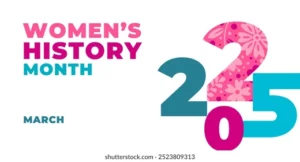Women’s History Month 2025 Honoring the Past, Inspiring the Future
Introduction
Women’s History Month 2025 is a time dedicated to recognizing and celebrating the invaluable contributions of women throughout history. Every March, people around the world reflect on the achievements of women in diverse fields, including politics, science, art, and activism. Women’s History Month 2025 serves as a reminder of the struggles women have faced, the victories they have won, and the ongoing efforts needed to achieve full gender equality.
This year, Women’s History Month 2025 brings a fresh perspective, emphasizing the upliftment and empowerment of women globally. It highlights the importance of honoring trailblazing women who have paved the way for future generations. As we celebrate this significant month, we also recognize the need for continued progress in ensuring equal opportunities and representation for women worldwide.
History of Women’s History Month
How it began
Women’s History Month originated in the early 20th century, beginning with International Women’s Day in 1911. Initially, it was a day dedicated to honoring women’s rights movements and advocating for gender equality. In 1980, the celebration became popular in the United States after President Jimmy Carter officially declared the week of March 8 as National Women’s History Week.
Major Milestones
- 1911: The first International Women’s Day was celebrated.
- 1980: National Women’s History Week established in the U.S.
- 1987: The celebration was extended to a month after advocacy efforts.
- 2000 to present: Women’s History Month becomes a globally recognized celebration with an annual theme highlighting various aspects of women’s contributions.
Theme for Women’s History Month 2025
Each year, a new theme is selected to reflect key issues affecting women around the world. The theme for Women’s History Month 2025 is “Women Leading Change: Breaking Barriers and Shaping the Future.
The theme highlights the growing role of women in leadership in a variety of fields, including politics, business, science, and activism. It also acknowledges the challenges women face when entering male-dominated fields and encourages society to support and nurture future female leaders.
Contributions of Women Throughout the Ages
Women in Science and Technology
Historically, women have made significant contributions to scientific and technological advancements despite facing barriers to education and professional opportunities. Notable individuals include:
- Marie Curie: The first woman to win the Nobel Prize for her groundbreaking research in radioactivity.
- Ada Lovelace: Considered the first computer programmer for her work on Charles Babbage’s Analytical Engine.
- Dr. Jennifer Dowdna: A modern scientist who co-developed the CRISPR gene-editing technology, revolutionizing medicine and genetics.

Women in Politics and Leadership
Women have been fighting for representation in governance and leadership for centuries. Some influential women in politics include:
- Eleanor Roosevelt: Former First Lady of the United States who played a key role in drafting the Universal Declaration of Human Rights.
- Malala Yousafzai: Nobel Peace Prize winner who advocates for girls’ education worldwide.
- Kamala Harris: First female Vice President of the United States, breaking barriers in American politics.
Women in Arts and Culture
From literature to music and filmmaking, women have played a major role in shaping cultural narratives:
- Maya Angelou: A poet and activist whose works have inspired generations.
- Beyoncé: A global music icon known for empowering women through her artistry.
- Greta Gerwig: A filmmaker breaking new ground with female-driven storytelling
Celebrating Women’s History Month in 2025
Events and Activities
Women’s History Month is celebrated around the world through a variety of events. Some common activities include:
- Educational Panels: Universities and organizations host discussions on gender equality, women’s rights, and leadership.
- Museum Exhibits: Special exhibits showcase historical artifacts, stories, and achievements of women.
- Community Gatherings: Local groups organize marches, art shows, and storytelling events to highlight women’s contributions.
How Schools and Workplaces Can Participate
Organizations and institutions play an important role in raising awareness and honoring women’s achievements:
- Schools: Teachers can integrate lessons on women’s history, hold essay contests, and invite female guest speakers.
- Workplaces: Employers can recognize women’s contributions, support mentoring programs, and encourage diversity and inclusion policies.
Ways to honor and support women today
Supporting women-owned businesses
One of the most effective ways to support gender equality is to empower women economically. Purchasing from women-owned businesses helps build economic independence and encourages innovation and entrepreneurship among women.

Advocating for gender equality
True equality requires sustained advocacy. Individuals and organizations can support gender equality by:
- Promoting equal pay and opportunities for women.
- Supporting policies that protect women’s rights, including parental leave and workplace safety.
- Donating to organizations that focus on women’s empowerment and education.
Inspiring the next generation of female leaders
Encouraging young girls to take on leadership roles is essential for a more equal future. Mentoring programs, scholarships, and media representation can inspire young women to break barriers in STEM, politics, and business.
Conclusion
Women’s History Month 2025 is more than just a celebration—it’s a call to action. As we reflect on the progress women have made, we must also recognize the work that still needs to be done. By supporting women’s achievements, advocating for gender equality, and empowering future leaders, we can create a world where every woman has the opportunity to flourish. Let’s continue to honor women—not just in March, but every day.
Frequently Asked Questions
Why do we celebrate Women’s History Month in March?
Women’s History Month evolved from International Women’s Day, which has been celebrated on March 8 since 1911.
What is the theme of Women’s History Month 2025?
The theme is “Women Leading Change: Breaking Barriers and Shaping the Future.”
How can I participate in Women’s History Month activities?
You can attend events, support women-owned businesses, and educate yourself about the contributions of women.
Who started Women’s History Month?
It began as Women’s History Week, declared by President Jimmy Carter in 1980, and was extended to a month in 1987.
What are some of the notable achievements of women in history?
From Marie Curie’s discoveries to Malala Yousafzai’s activism, women have made significant contributions in fields such as science, politics, and the arts.
Women’s History Month evolved from International Women’s Day, which has been celebrated on March 8 since 1911.
The theme is “Women Leading Change: Breaking Barriers and Shaping the Future.”
You can attend events, support women-owned businesses, and educate yourself about the contributions of women.
It began as Women’s History Week, declared by President Jimmy Carter in 1980, and was extended to a month in 1987.
From Marie Curie’s discoveries to Malala Yousafzai’s activism, women have made significant contributions in fields such as science, politics, and the arts.
Share this content:



Post Comment